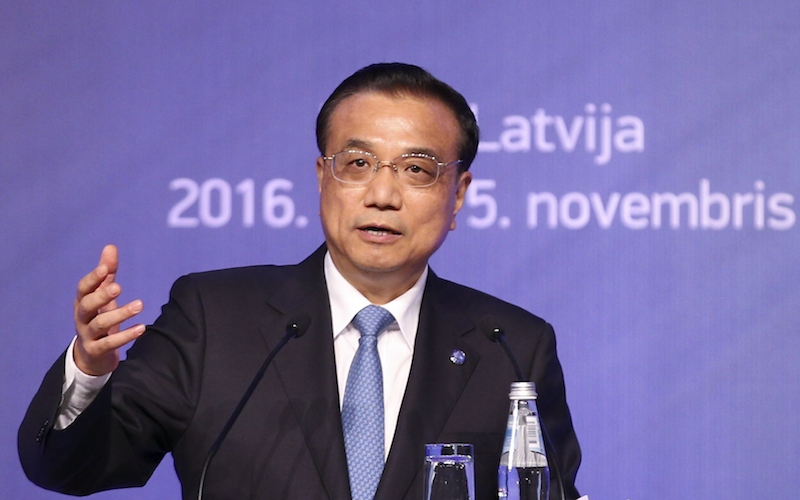
Eastern Europe’s Chinese Gamble
What do you do if you can’t get what you want from the West? The answer, of course, is to go to China.
At least, that is the case for the sixteen countries in Central and Eastern Europe, which attended the latest summit of the ‘16+1’ in the Latvian capital of Riga earlier this month. The star guest was the Chinese Premier Li Keqiang, who pledged a pot of 10 billion euros for the region, intended for the development of infrastructure, manufacturing, industry, energy and much more besides.
This follows an intensifying series of high-level visits and political exchanges in the last couple of years, and deepening Chinese investment in Eastern Europe in everything from steel to cars, hotels, banking, telecommunications, beverages, real estate, airlines, travel companies and even football clubs.
All this poses something of a mystery given that most states in Eastern Europe have never before had a meaningful political or economic relationship with China. So what is going on?
China Comes to Town
Inevitably, a relationship between China and Eastern Europe is a tango of two partners.
And from China’s point of view, Eastern Europe is an ideal entry point to the all-important western European market, lying at a crucial position on its ‘One Belt, One Road’ vision of a twenty-first century Silk Road connecting Europe and Asia. Not only are assets cheaper and the operating environment less competitive, but much of Eastern Europe has tariff-free access to the EU’s single market, making it a favorable location to base Chinese operations.
To sweeten the deal, states outside the EU, in the Balkans and former Soviet Union, are able to offer Chinese investors tailor-made investment packages that include subsidies and tax-breaks. This stands in stark contrast to the unwelcoming environment in parts of Western Europe such as Germany.
Alongside this, China also has political motives for establishing a presence in Eastern Europe. For one thing, it can use its presence in countries in the EU’s east, such as Hungary and Poland, to lobby for recognition as a market economy, which would confer advantages such as effective immunity from anti-dumping duties.
In addition, by increasing its leverage, China can garner support on issues of strategic importance closer to home such as its ‘One China’ policy and its various territorial disputes in the South China Sea. As the Czech government recently discovered, this can be the price to pay for the benefits of doing business with China.
The Ease of Doing Business
From the vantage point of Eastern Europe, Chinese investment constitutes a short cut to modernizing the local economy and close the development gap with western Europe. In fact, China could not be easier to do business with. It has huge reserves of foreign capital, which it has earmarked for spending in the region. And deals are quick to negotiate, usually involving agreement at an intergovernmental level, followed by a quick and efficient process for the approval of funding.
By contrast, private investors from the West are often averse to entering into difficult business environments such as in the Balkans and the former Soviet Union, and won’t invest in unfashionable sectors such as Poland’s coal mines. Multilateral lenders such as the IMF and the World Bank also insist on unwelcome reforms as a precondition for lending and only offer structural and cohesion to member states and even then, only on the condition of meeting minimum standards of transparency.
Strings Attached
However, while there are demonstrable benefits for Eastern Europe, China’s growing presence in Eastern Europe also carries risks for the region.
Some of these are commercial. Most Chinese investment in Eastern Europe is financed by loans from a Chinese export bank to a government in the region which pays a Chinese company to carry out the work while assuming the resulting liability. In some cases, the host government can ill afford the additional fiscal burden.
Another problem is the requirement to use a nominated Chinese company. Not only does this rule out the use of local contractors, limiting the benefit to the recipient country; but, in some cases, it also means overpriced and substandard work.
There are also political risks. In many cases, Chinese investors bring a Chinese workforce with them, creating resentment among local workers, who may be unemployed or underemployed. In Belarus, there is consternation after more work permits were awarded to Chinese in 2016 than to any other nationality.
Some governments also fear Chinese espionage, such as the Czechs who vetoed a co-operation agreement with the telecommunications company Huawei earlier this year due to fears that Chinese spies would use the local phone network to wiretap sensitive communication.
Meanwhile, the absence of economic or political conditionality absolves local governments of any need to Westernize their countries as a quid pro quo for their modernization, undermining efforts by the West to promote the rule of law, democracy and market-based reform. This is especially true of the Western Balkans which are subject to the conditions set out in the EU’s enlargement process.
Over Exposure
But perhaps the most serious risk is the future of China itself. For now, it may make sense for the Eastern Europeans to bypass the West and develop a close economic relationship with China. But for all its virtues, China is still an emerging economy with an unorthodox economic model, a mounting debt problem and a slowing economy that could potentially hit a financial brick wall.
The more investment Eastern Europe accepts from China, the more it is exposed to the risks of such an eventuality. Not only could this bring a sudden halt to the flow of investment capital but Chinese banks could also recall the loans they have already issued.
There are also uncertainties about China’s future political direction. Already, governments are wary of giving Chinese companies operational control over strategic sectors such as energy, transportation and technology in case relations turn sour at some point in the future.
However, political change could have more fundamental effects. The one precedent for China’s current involvement in Eastern Europe was during the communist era, when it sponsored the development of a Maoist acolyte in the form of Enver Hoxha’s Albania. This suited Albania while it lasted. But when China mended its relations with the US in the 1970s and was internationally rehabilitated, its relationship with Albania came to a sudden end, leaving the country economically stranded.
No one can say for certain what China’s next turn will be. But when Chinese investors are ultimately subject to political control by the ruling communist party, then Eastern Europe should be wary of what that might mean for the future.

